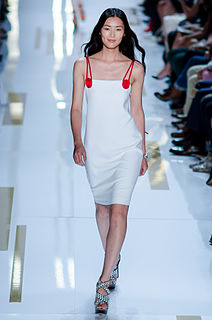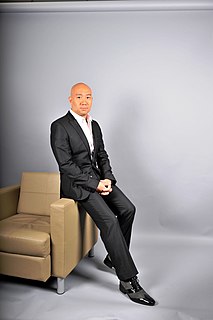Related Research Articles

Sonia Rykiel was a French fashion designer and writer. She created the Poor Boy Sweater, which was featured on the cover of French Elle magazine. Her knitwear designs and new fashion techniques led her to be dubbed the "Queen of Knits". The Sonia Rykiel label was founded in 1968 upon the opening of her first store, making clothing, accessories and fragrances. Rykiel was also a writer and her first book was published in 1979. In 2012, Rykiel revealed that she was suffering from Parkinson's. She died from complications of the disease on 25 August 2016.

Marc Jacobs is an American fashion designer. He is the head designer for his own fashion label, Marc Jacobs, and formerly Marc by Marc Jacobs, a diffusion line, which was produced for approximately 15 years having been discontinued after the 2015 fall/winter collection. At one point there were over 200 retail stores in 80 countries. He was the creative director of the French design house Louis Vuitton from 1997 to 2014. Jacobs was on Time magazine's "2010 Time 100" list of the 100 most influential people in the world, and was #14 on Out magazine's 2012 list of "50 Most Powerful Gay Men and Women in America". He was married on 6 April 2019 to his long time partner, Charly Defrancesco.

The Design Exchange (DX) is a cultural organization that champions creative thinking, inspires problem solving, and celebrates innovative talent in Canada and around the world in Toronto, Ontario, Canada. DX serves as Canada’s design hub, by being a crossroads for multiple disciplines that demonstrate the power of design, innovation, and technology to change the world for the better for everyone, through the delivery of a range of engaging and enriching public programs and exhibitions.

New York Fashion Week, held in February and September of each year, is a semi-annual series of events when international fashion collections are shown to buyers, the press, and the general public. It is one of four major fashion weeks in the world, collectively known as the "Big 4", along with those in Paris, London, and Milan. The Council of Fashion Designers of America (CFDA) created the modern notion of a centralized "New York Fashion Week" in 1993, although cities like London were already using their city's name in conjunction with the words fashion week in the 1980s. NYFW is based on a much older series of events called "Press Week", founded in 1943.

Fashion Week in Los Angeles occurs biannually. Multiple show producers hold events throughout the Greater Los Angeles area each March and October. Traditionally, the City of Los Angeles identified the third weekend of those respective months as the beginning of its Fashion Week. However, new independent event producers have been transitioning Fashion Week related activities to coincide closer in time with the LA Fashion Market Week.
CELINE is a French ready-to-wear and leather luxury goods brand that has been owned by LVMH group since 1996. It was founded in 1945 by Céline Vipiana. Since November 2015, the headquarters are located at 16 rue Vivienne in the 2nd arrondissement of Paris at the Hôtel Colbert de Torcy, which has French Historic Monument classification. Séverine Merle is the Chief Executive Officer since April 2017.

Fern Mallis was the executive director of the Council of Fashion Designers of America (CFDA) from 1991–2001, and created 7th on Sixth productions or New York Fashion Week as it is known today. She was also senior vice president of IMG Fashion from 2001 to 2010. Mallis is currently president of her own international fashion and design consultancy, Fern Mallis LLC. She received her BFA from University at Buffalo.
Project Runway Canada Season 1 was the first season of Project Runway Canada, Slice's reality competition show for fashion designers. The season received critical acclaim since being based on the successful American version of the show and went on to win a Gemini Award. Project Runway Canada gave Slice one of its most successful series since the launch of its new branding.

Kay Unger is an American fashion designer. Until July 2012 she was the creative head and public face of Phoebe Company LLC and its brands; Kay Unger New York, Phoebe Couture, Unger by Kay Unger and Kay J's by Kay Unger.
Linda Lundström, O.Ont., is a Canadian fashion designer.

WOOYOUNGMI is a South Korean menswear clothing brand launched in Paris by the designer Youngmi Woo in 2002. It is sold through own-brand stores and global retailers. Art and architecture are sources of inspiration for the brand. The brand has become known for tailoring. In 2014, The Korea Herald wrote that “Wooyoungmi has become the most successful Korean independent menswear designer brand.”

Toronto Fashion Week (TFW), held in February and September of each year, is a semi-annual event celebrating fashion, arts and culture where Canadian and international fashion collections are shown to buyers, the press, and the general public. It is the largest fashion week held in Canada and the second largest fashion week in North America, after New York Fashion Week.

Vancouver Fashion Week (VFW) is a fashion week in Vancouver, British Columbia, Canada that is currently run by Jamal Abdourahman. The event is seven days long each season and held twice a year. Vancouver Fashion Week was established in 2001.

Budapest Fashion Week is a fashion week trade show held annually in April and October in Budapest, Hungary, usually after the five major fashion weeks. It is still aspiring to the level of big five fashion weeks. Based on the concept of the international fashion week series, TONI&GUY Fashion Week Budapest is an event, where the leading Hungarian fashion designers and international designers gain platform to introduce their seasonal collections twice a year for the Hungarian and international fashion industry and the public as well. The event is usually held in the Palazzo Dorottya.

Dan Liu Kin Ming also known as; Liu Tatsuaki is a Hong Kongese and Japanese Canadian fashion designer and producing apparel, accessories and fashions for men and women. He is also the founder and the creative director of TATSUAKI fashion label. He was born in Hong Kong and is currently based in Toronto and Tokyo.
Fashion East is a non-profit designer support and showcasing scheme, a project established by the Old Truman Brewery and Lulu Kennedy MBE in 2000. Designers can apply for support across three different programmes. Each programme offers fashion week showcasing opportunities, business mentoring & financial sponsorship for menswear and womenswear designers. Designers are selected by Lulu Kennedy and a panel of industry people.

Sid Neigum is a Canadian fashion designer. He currently lives and works in Toronto, Ontario.
Donald Robertson, is an artist and a creative director for Esteé Lauder Companies.
Angela DeMontigny is a native Canadian fashion designer of Cree-Métis heritage. She is known for her use of leather and suede in her clothing and handbags, as well as cultural motifs from her background including fringe, beadwork and cutwork in a style she describes as "indigenous luxury." DeMontigny has exhibited her collections internationally, including at the 2017 South African fashion week and London Fashion Week 2018. She also speaks about and advocates for indigenous designers and models, producing shows of Aboriginal fashion and serving on the World Indigenous Fashion Council as the Head for North America.
Sania Maskatiya is a respected Pakistani fashion designer. Her clothing line is called Sania Studio, which was featured in the 2018 edition of New York Fashion Week. She has won many LUX Style Awards for Achievement in Fashion Design. A textile design graduate of the prestigious Indus Valley School of Art and Architecture in Karachi, Pakistan, Sania Maskatiya joined hands with business partner and director, Umair Tabani, in 2010 to creative a distinctive fashion label that captured the fashion industry by storm. Her brand is known for including rich textiles, fabric design and embroidery within its pieces. Through the success of her brand, Sania Makatiya became one of Pakistan's renowned fashion designers and exports, with branches all over Pakistan, and in Dubai, Singapore, The United States, Canada, and the United Kingdom.
References
- 1 2 "WeConnectFashion Search - Company Profile and Description, Fashion Design Council Of Canada FDCC Business Contact". Weconnectfashion.com. Retrieved 20 November 2014.
- ↑ Pat McDonagh, legendary Canadian designer on her life and legacy. Interview by Sherrill Sutherland, The Globe and Mail , 2 June 2014.
- 1 2 "IMG - FASHION DESIGN COUNCIL OF CANADA AND IMG FASHION, JOINTLY ANNOUNCE IMG AS NEW OWNER AND PRODUCER OF". Img.com. Archived from the original on 29 November 2014. Retrieved 20 November 2014.